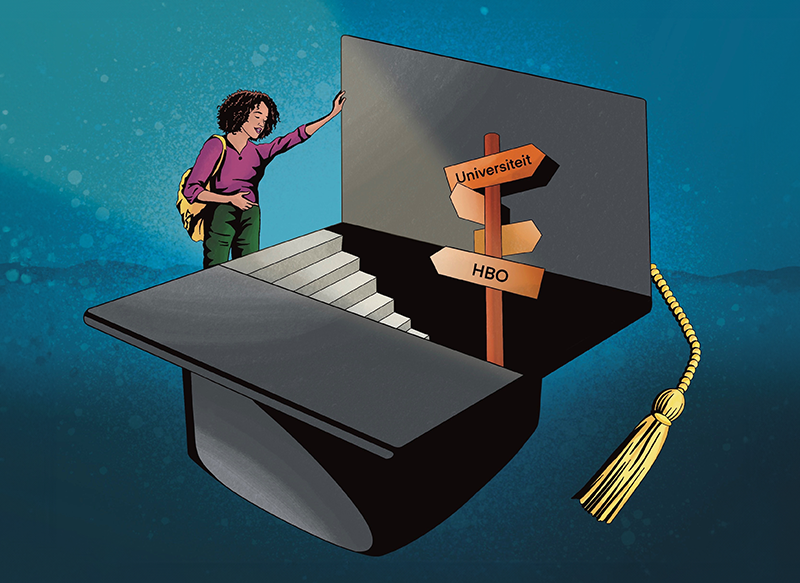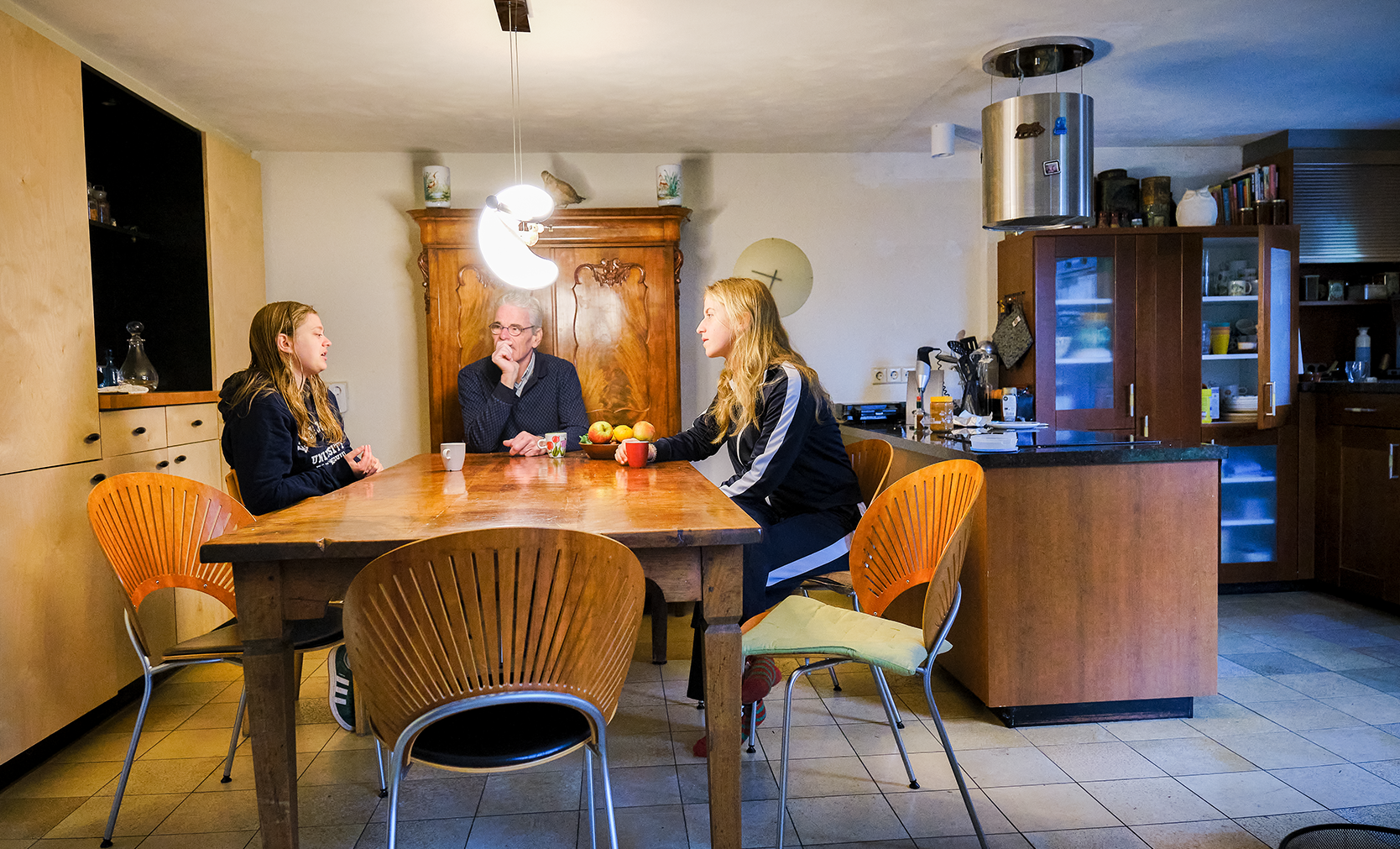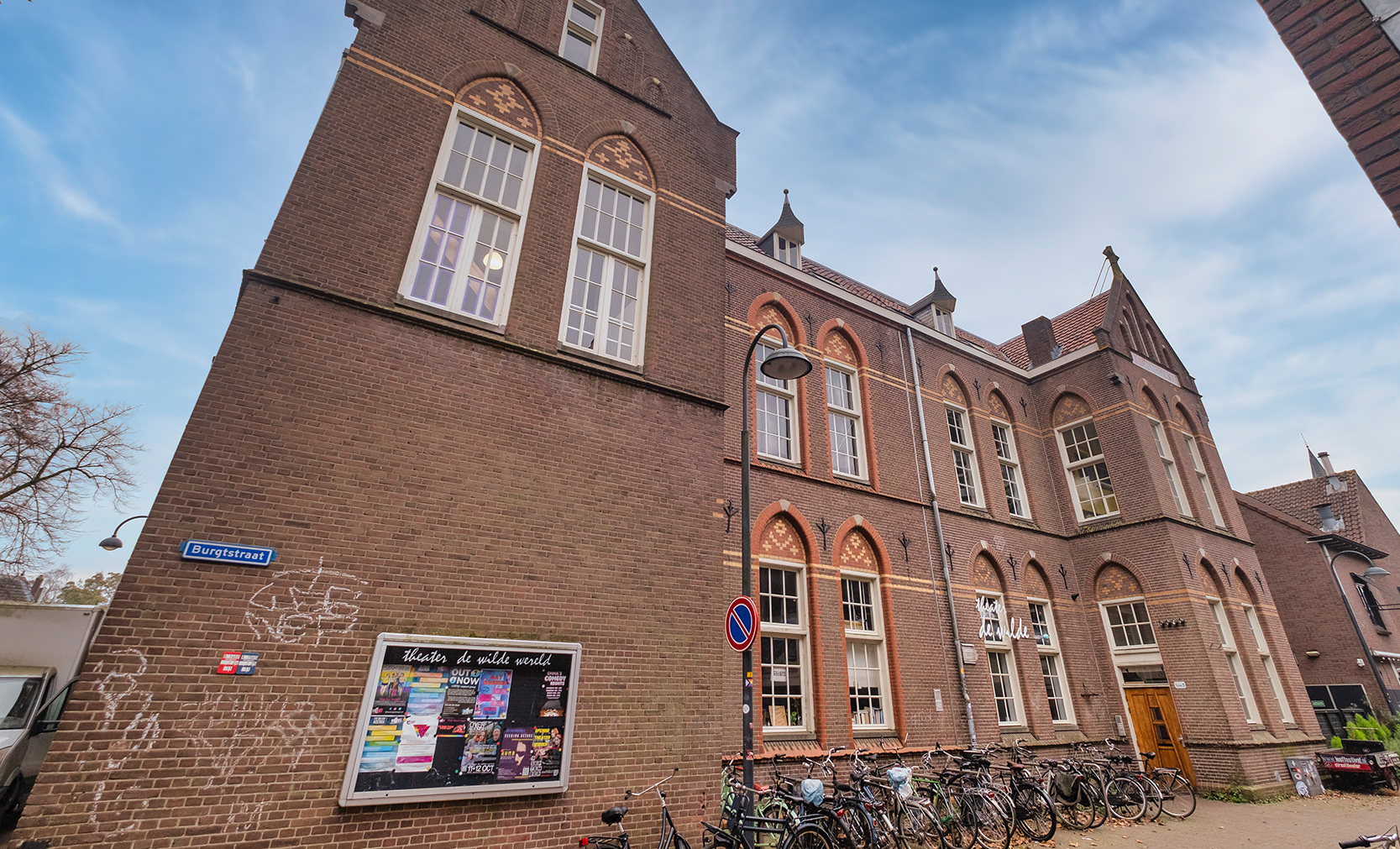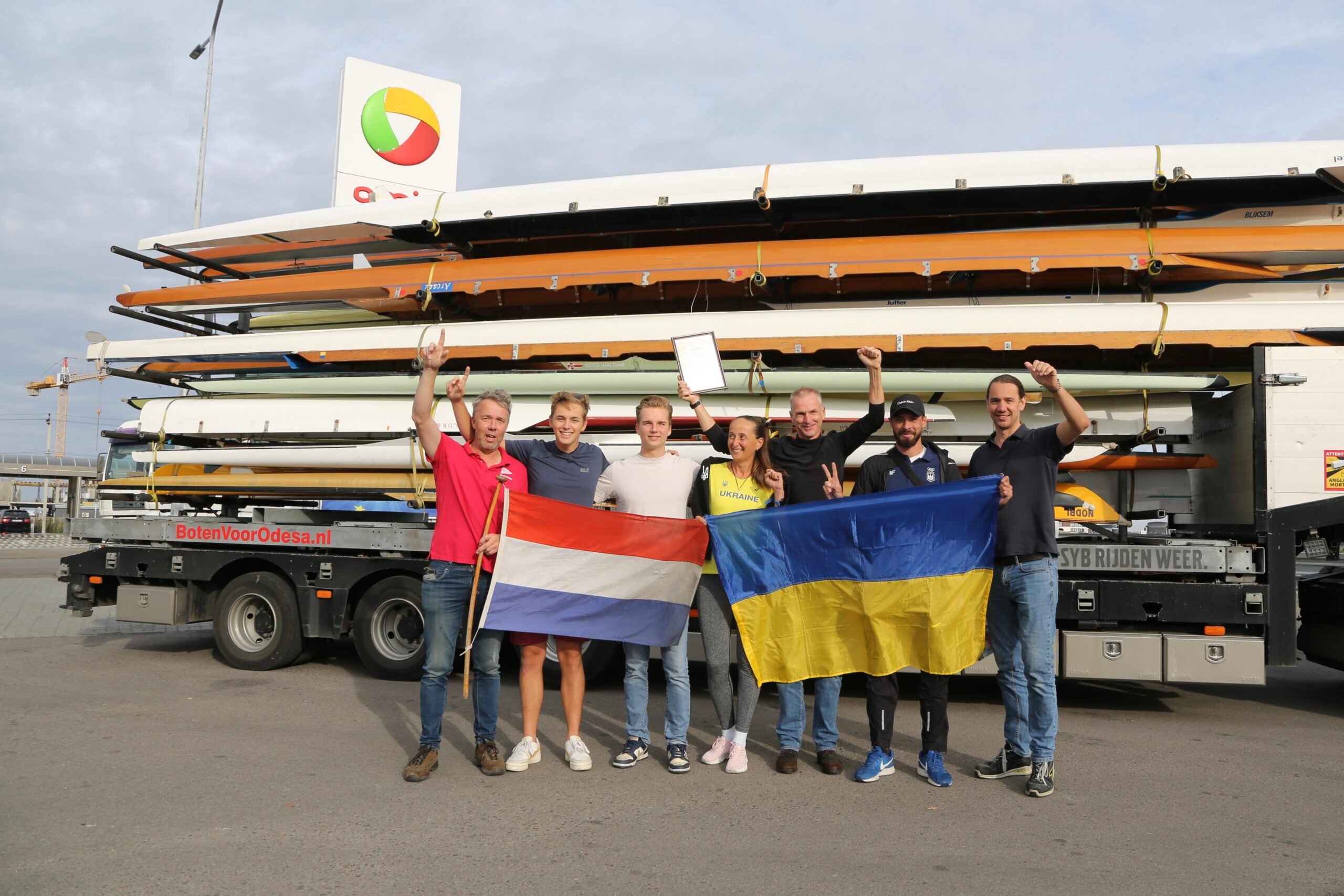Between 10 and 15 per cent of students at the official research universities in the Netherlands would be better suited to other institutions such as one of the applied science universities, says Education minister Dijkgraaf. How are such students faring in Wageningen? And how can they find their niche more quickly?
As a study advisor, Lieke de Kwant (International Development Studies) sees a lot of different students. The group the minister is talking about – those on the wrong kind of degree course – can ‘roughly’ be divided into two groups, she says.
I know the stories of WUR students who transferred to a HBO degree and blossomed there because of the more hands-on learning style
‘The first group take the programme in their stride but gradually realize they would rather train for “a vocational profession”. They often transfer at some point to a HBO [applied sciences, ed.] degree course.’
Then there are the strugglers. She worries more about that group. ‘As a study advisor, I sometimes see students who only just pass their first year, but after that get maybe 30 to 60 study points per year. Then you are still ploughing your way through second-year courses when students who started the same year as you might have finished their Master’s already and have a job. That affects your mental health.’
Exhaustion
These students often put themselves under tremendous pressure, says De Kwant. ‘Struggling students think they ought to be able to reach “the standard”. As though you are a failure as a human being if you don’t get an academic degree.’ The further these students get with their degree, the louder the internal voice that says they must finish it. ‘Even if they have only got half the study points after three years. Struggling like that can totally exhaust you.’
De Kwant wants to impress upon struggling students that there are many roads to Rome. ‘I know the stories of WUR students who transferred to a HBO degree and blossomed there because of the more hands-on learning style. If you are struggling now: talk about it with your friends, fellow students or your study advisor. And another tip: sign up for Personal Motivation Assessment – a short course in which you learn to systematically examine how you learn and what your main driver is. It can help you to discover what would suit you.’
Other study advisors see the picture De Kwant sketches too. Petra den Besten has been the stand-in study advisor in several programmes (she’s currently with Marine Sciences). ‘It seems as though in our society, young people choosing their degree course always go for the highest possible: if you’ve been in the academic stream in secondary school (VWO), you automatically go to a theory-oriented university.’ As a result, she thinks, many VWO students don’t even consider applied sciences programmes. ‘Instead of thinking: I want to do something to do with biodiversity or nature, and this is the highest level possible for me, they should think: I want to do something to do with biodiversity and preferably work with my hands out of doors – so which programme fits the bill?’
Choosing a degree
Daniëlle Vogels is WUR’s advisor to mentors and deans in secondary schools, and to the parents of prospective students. She thinks outgoing minister Dijkgraaf is doing his best to help students make the right choice. ‘Final exam candidates all get a letter sent to their homes, which now mentions that when you choose a degree programme, it is important to consider what you get pleasure and satisfaction from, to increase the chances of successfully finishing the course.’
We had classes about a communication model and all I could think was: what use is that?
That doesn’t immediately remove the pressure to go to an academic university that VWO students experience, says Vogels. ‘Last January we at the Pre-University programme and others including Van Hall Larenstein and Aeres (both applied sciences universities, ed.) held a study day for secondary school deans. We discussed the fact that VWO careers counsellors can make sure their pupils consider applied sciences programmes. I hear stories about deans who do that, but then the pupil’s class teacher tells them they’d be crazy to choose an applied science degree. Of course, that makes a big impression on the pupil.’
The parents of pupils making this choice add to the pressure too. ‘They want the best for their child and they often think that is an academic university education,’ says Vogels. ‘What they might not know is that there is a very high drop-out rate. Nationwide, 30 per cent of students in higher education drop out of their programme in the first year. Of those, 38 per cent say they stopped because “the way it is taught” doesn’t suit them.’ The drop-out rate in Wageningen is actually a lot lower than the national average: here 13 per cent of first-year Bachelor’s students drop out, although there are big differences between degree programmes.
Theoretical or practical?
To ensure that VWO pupils consider applied sciences degrees as well, the government is funding projects aiming at lowering the dropout rate, says Vogels. In that context, WUR is working with Van Hall Larenstein, Aeres and the Christelijke Hogeschool Ede, says Vogels. ‘On a set of cards, for instance, that gets pupils thinking about what learning style suits them. Is it theoretical or more practically oriented?
Although they still feel under pressure to go to an academic university, says Vogels, ‘more VWO pupils now say that they are considering applied sciences options, although some are still told by those around them that that would be “stupid”. Luckily, though, more and more people say: look at what suits you.’
Three ex-WUR students starting an applied sciences degree talk about their experience.
Marion van Leusen (22) studied International Development Studies at Wageningen. She got her Bachelor’s degree in 2023 and started training to be a music teacher in Zwolle.
‘VWO went well for me at secondary school, so I went to university. Wageningen appealed to me because it uses science to do good for the world. On paper, I though my degree course was great too. You might work on a case study about how fishers in Mali can improve their catches, for example. I like the idea of tackling that in a nice practical way, but for me it was too much theory and reading of academic papers rather than getting together with NGOs to solve practical problems.
Because I started my degree during the pandemic with a lot of online classes, I wasn’t too surprised that I didn’t love it from the start. Only when we were allowed to do more on campus did I realize: this is not what I’m looking for. Only I didn’t know what I did want to do.
I started exploring my options and the idea of a music school came up. I could audition in March of my third year at Wageningen and I would be told whether I was admitted in April. Meanwhile, I worked hard to finish my WUR Bachelor’s. Which I managed to do, luckily.
I am totally in the right place at the music school. I am learning to compose and developing as a musician. You are thrown into the classroom as a trainee teacher early in the course and you just have to figure it out. That suits me, because I want to learn more about myself every day, push my boundaries, and be able to do something for other people.’
Maud Ottenheim (23) studied Communication & Life Sciences at Wageningen in 2019-2020. Now she’s doing the applied sciences degree in Social Work at the Christelijke Hogeschool Ede. In September she will start a ‘pre-Master’s’ course in Forensic Child and Youth Care Sciences at the University of Amsterdam.
‘Because all my friends went to university, it was a matter of course that I did so too: why else would you do VWO for six years? I didn’t consider an applied sciences option.
During my first year I realized that Communication & Life Sciences wasn’t my thing. We had classes about a communication model and all I could think was: what use is that? I wanted to work with people and I transferred to Ede to do Social Work. The teaching style took a bit of getting used to: it’s far more school-like. In terms of the education approach I actually preferred Wageningen, but I opted for an applied sciences degree because of the practical experience you gain, on two compulsory internships, for instance.
I am currently doing an internship with the youth probation service. I am doing a lot of work on criminal behaviour among young people and the best way to deal with it. I’m getting practical experience now, but an in-depth understanding is important to me, so I’ll soon be looking for that at university again. In September I’ll be starting my pre-Master’s course on Forensic Child and Youth Care Sciences at the University of Amsterdam. For me, that combination of practice and in-depth knowledge is very valuable.’
Lotte Aalbers (21) studied Health and Society at Wageningen. In 2023, she got her Bachelor’s degree and embarked on an in-service nursing training programme in Utrecht.
‘At secondary school I was in a combined stream for two years and the teachers’ advice was “just do” the shorter HAVO school programme to qualify for an applied sciences course. That motivated me even more to do VWO, just to show that I could. And when I passed it seemed logical to go to university.
I went to Wageningen and enjoyed the freedom you have as a student, but I wasn’t excited about my degree course. I thought: is this it? And then go on to write policy papers, become a consultant or go into research? All useful things but not necessarily right for me. I hadn’t been in Wageningen long when I got a First Aid qualification and got a job at a vaccination centre, where I talked to nurses and doctors. I thought: wow, if you work in healthcare, you have a direct impact on the lives of the people you help.
I finished my Bachelor’s and then started an in-service nursing training programme, which entails working at the university hospital in Utrecht three days a week, and taking classes at the applied sciences university one day a week. That way I do what is normally a four-year degree in three years. The work pressure is high but to me it’s a nice challenge.
I was doubtful for a long time before taking the plunge. People think it’s funny that I did an applied sciences Bachelor’s after getting an academic one, because it’s supposed to be “below my level”. Actually, that’s crazy, because I’m a lot happier where I am now. This is what I really want to do.’

 ‘Struggling students believe that they should be able to cope with the level, as if you have failed if you do not do an academic study.’ Illustration Valerie Geelen
‘Struggling students believe that they should be able to cope with the level, as if you have failed if you do not do an academic study.’ Illustration Valerie Geelen 

